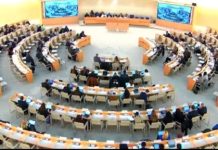By Rohey Jadama
Justice Eunice O. Dada of the Banjul High Court yesterday 26 May, 2016 overruled the defence’s applications for the court not to  continue with the case of Mr. Ousainou Darboe, the leader of the United Democratic Party (UDP), and nineteen others, as per section 5 sub section 3 of the high court Practice Direction and to refer counts 5 and 6 to the Supreme court for interpretation.
continue with the case of Mr. Ousainou Darboe, the leader of the United Democratic Party (UDP), and nineteen others, as per section 5 sub section 3 of the high court Practice Direction and to refer counts 5 and 6 to the Supreme court for interpretation.
The other accused persons are Kemeseng Jammeh, Femi Peters, Lamin Dibba, Lamin Jatta, Yahya Bah, Babucarr Camara, Fakebba Colley, Ismaila Ceesay, Momodou Fatty, Dodou Ceesay, Samba Kinteh, Mamudu Manneh, Nfamara Kuyateh, Fanta Darboe, Lamin Njie, Juguna Suso, Momodou L.K Sanneh and Yaya Jammeh.
When the case was called, the Director of Public Prosecutions (DPP), Hadi Saleh Bakun appeared for the state while Lawyer Antouman Gaye and a team of lawyers announced their representation for the accused persons.
Delivering his ruling Justice Dada said at the last adjourned date Lawyer Gaye applied for the court not to continue with the case and cited section 5 subsection 3 of the ‘Practice Direction section which states that a succeeding judge shall not continue with a case or ruling, rather it should be heard in trial de-novo.
She said responding to the defence counsel, the DPP argued that criminal cases do not start with trial de-novo. He said he has been in this jurisdiction for eight years and has prosecuted numerous criminal cases in different courts which were referred to other judges and such applications had never been made.
The presiding judge said where a judge is unable to continue with a trial the Chief Justice shall assign it to another judge who shall continue where the other judge stopped and that the court rules take precedence over the practice direction relied upon by the defence.
Accordingly, Justice Dada refused the application of the defence and ruled that she shall continue hearing of the case.
Also ruling on whether to refer count 5 and 6 to the Supreme Court for determination as applied for by Barrister Awa Sisay-Sabally, who urged the court to refer the said counts to the Supreme Court with the following questions: “Whether section 5(2) and (5) of the Public Order Act 1961 cap 2201 volume 4, as it relates to the requirements of permit or license from the Inspector General of Police, is consistent with section 25 of the 1997 Constitution which guarantees freedom of speech, expression and assembly?”, “Whether section 5 of the Public Order Act was made in excess of powers vested on the national assembly?” and “Whether the said section as amended is null and void by virtue of section 4 of the 1997 constitution of the republic of the Gambia?”
Justice Dada said replying to the application, the DPP said the question before the court is not to determine the legislative competence of the National Assembly. He said the question before this court is whether the accused persons are guilty or innocent of the charges filed against them on the 28 of April 2016.
The presiding judge said she has listened to the submissions of both parties and that it is her considered view that sections 25 and 100 of the 1997 constitution are very clear and do not need a referral to the Supreme Court for determination and that accordingly the application for referral is refused.
The court, however, granted the defence’s application for all the accused persons to be allowed to sit down during proceedings because of their old age and ill health and of some of them. It only required all the accused persons to stand up until after the name of the last person is called before resuming to sitting at the start of proceedings.
The case was subsequently adjourned to 2 and 6 June at 12: noon, 7 and 8 June at 2pm respectively for hearing.





















